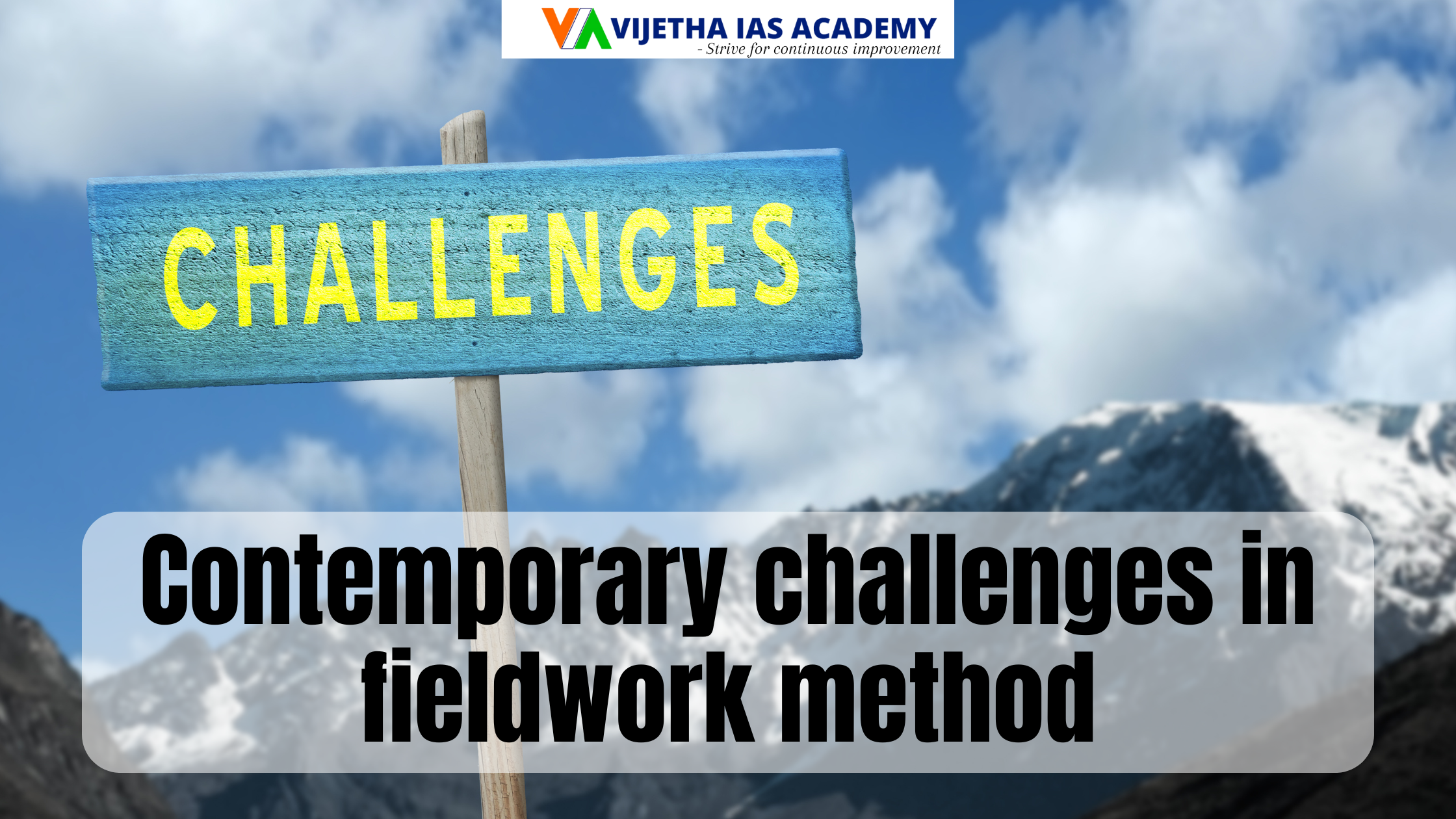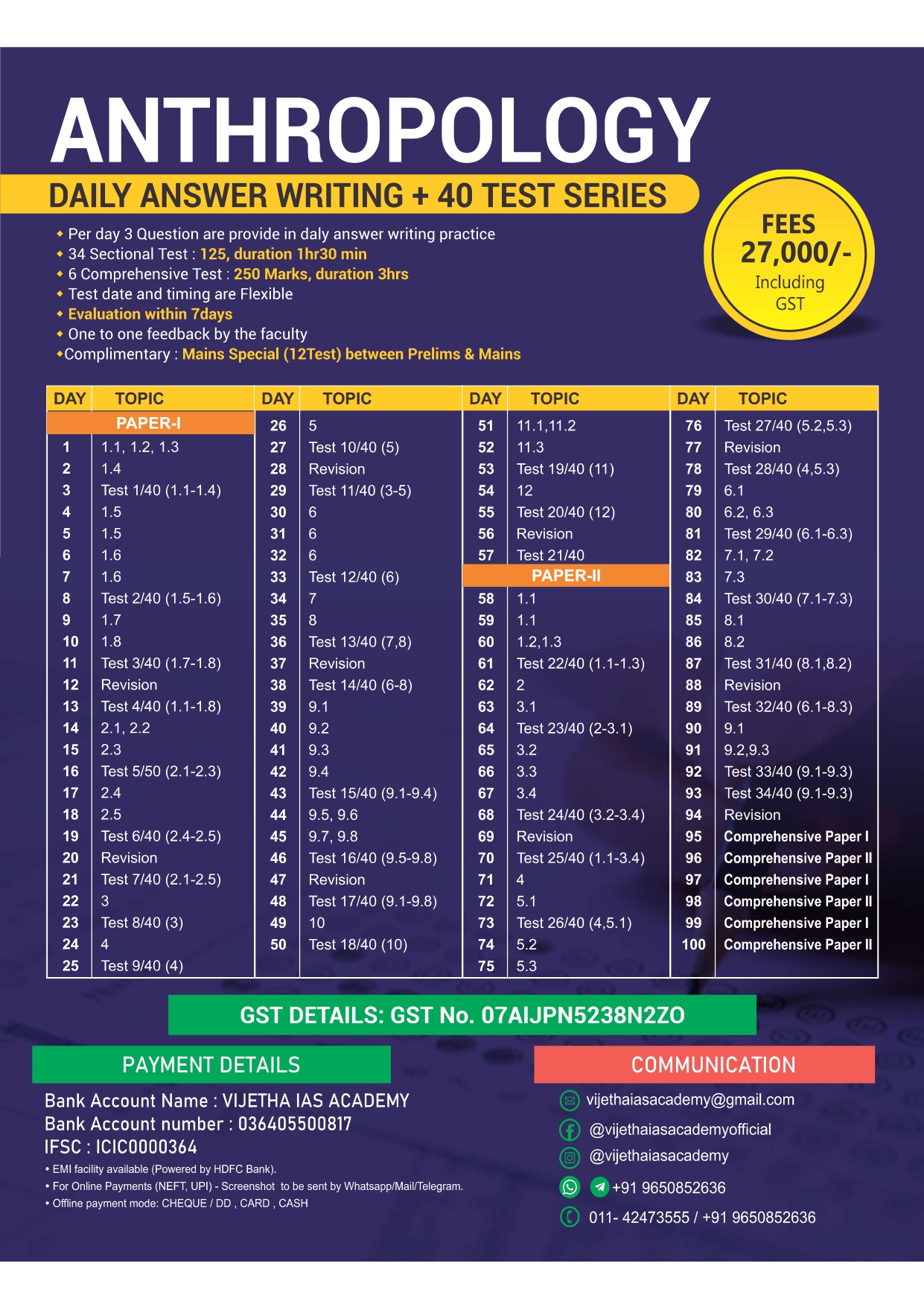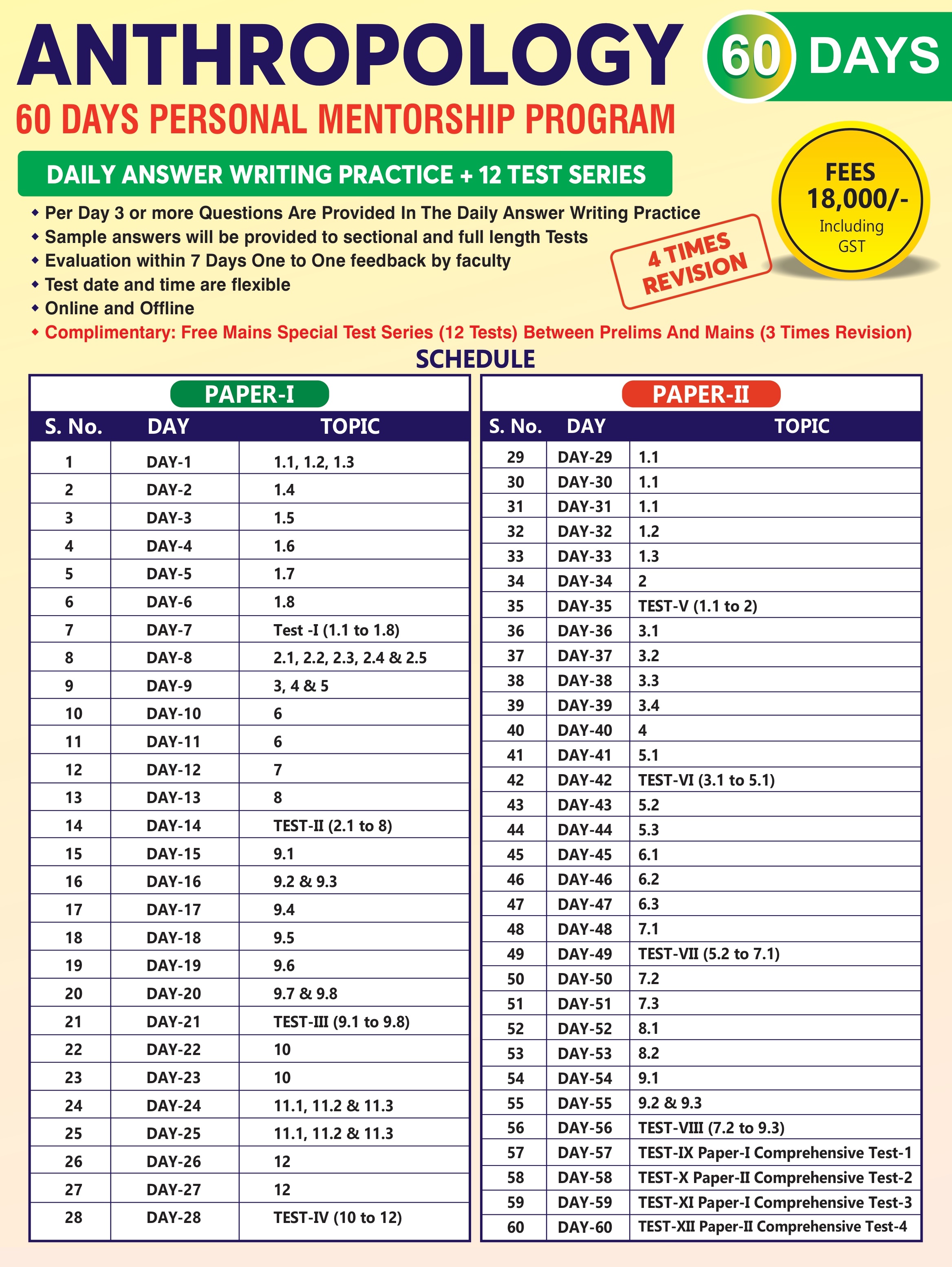
Discuss the contemporary challenges in fieldwork method in anthropological research.
(15 Marks) Anthropology Optional Paper CSE 2024
Introduction
Fieldwork has long been a cornerstone of anthropological research, providing in-depth insights into the cultural, social, and biological aspects of human life. It involves immersive, long-term engagement with a community or group, typically using participant observation, interviews, and other qualitative techniques. However, contemporary anthropological fieldwork faces several challenges due to changing social, political, technological, and ethical landscapes.
Main Body
Ethical Concerns:
Informed Consent and Privacy: With increasing awareness about individual rights and privacy, obtaining informed consent has become more complex. Anthropologists must ensure that participants fully understand the nature of the research and the potential uses of the data collected. This is particularly challenging in communities with low literacy rates or where formal legal processes may not be understood.
Power Dynamics and Exploitation: Fieldworkers must navigate power imbalances between themselves and the community. Historically, anthropological research has been criticized for exploiting marginalized communities for academic gain without providing tangible benefits in return. Addressing these concerns requires more equitable research practices and reciprocal relationships with the community.
Political and Geopolitical Issues:
Access to Field Sites:
Political instability, conflict zones, and government restrictions can limit access to certain regions. For example, areas affected by conflict or authoritarian regimes may pose risks to both the researcher and the community. Additionally, visa restrictions or bureaucratic hurdles can impede anthropologists’ ability to conduct fieldwork in certain countries.
Researcher Safety:
Anthropologists conducting fieldwork in politically sensitive or unstable regions may face physical danger, threats, or imprisonment. This is particularly relevant for fieldworkers studying marginalized or persecuted groups, where their presence might attract unwanted attention from local authorities or opposition groups.
Changing Nature of Communities:
Urbanization and Globalization:
The rapid pace of urbanization and globalization has led to increased cultural homogenization. Communities that were once isolated or distinct are now influenced by global media, technology, and migration, making it difficult to study "authentic" or traditional cultures. For example, rural populations migrating to cities may experience shifts in social organization and values, complicating longitudinal studies.
Fluid Identities: Modern identities are increasingly fluid, with individuals often belonging to multiple cultural, ethnic, or social groups. This makes defining and studying a specific "community" challenging, as people may not adhere to a single, unified cultural or social framework.
Technological Influence:
Digital Anthropology: The rise of the internet and social media has created new spaces for human interaction, requiring anthropologists to adapt their fieldwork techniques. Virtual communities and digital platforms now serve as field sites, but they pose challenges in terms of data collection, consent, and the ephemeral nature of online interactions.
Data Collection Tools: While technology has improved data collection methods (such as audio/video recording, GPS tracking, and digital surveys), it also raises concerns about data security, privacy, and the potential for digital surveillance by external actors.
Methodological Challenges:
Reflexivity and Objectivity: The notion of reflexivity, where anthropologists are aware of their influence on the research process, has gained prominence. This complicates the idea of objective fieldwork, as the researcher’s background, biases, and positionality inevitably shape the data collection and interpretation process.
Shorter Timeframes for Fieldwork: Due to funding constraints, academic pressures, and personal responsibilities, many anthropologists are unable to conduct long-term fieldwork as traditionally practiced. This limits the depth of engagement and understanding of the community, potentially affecting the quality of research outcomes.
Ethnographic Representation:
Decolonization of Anthropology: There is growing awareness of the need to decolonize anthropological fieldwork, ensuring that the voices of indigenous and local communities are not overshadowed by the researcher’s interpretation. Researchers are increasingly collaborating with local scholars and community members to co-produce knowledge and ensure more balanced representations.
Language Barriers: Effective fieldwork often requires proficiency in the local language. However, learning a new language to a level of fluency sufficient for nuanced understanding can be difficult within the limited timeframe of field research.
Environmental and Climate Challenges:
Climate Change: Field sites in ecologically sensitive areas may be affected by climate change, forcing researchers to adapt to changing landscapes or communities that are displaced by environmental degradation. For example, indigenous communities in the Arctic face changing migratory patterns and lifestyle adjustments due to melting ice caps.
Environmental Degradation: In areas affected by deforestation, pollution, or over-extraction of natural resources, communities may undergo rapid changes in their subsistence patterns, social structures, and health. This can alter the very subject of the research during the study period.
Conclusion
Fieldwork remains a critical method in anthropological research, but contemporary challenges—ranging from ethical concerns and geopolitical barriers to technological changes and the effects of globalization—require new approaches and adaptations. Anthropologists must be reflexive, flexible, and innovative in addressing these challenges while ensuring ethical and culturally sensitive research practices. As the discipline evolves, fieldwork methodologies must also adapt to maintain relevance and rigor in the changing global landscape.
Anthropology Test Series Programme (Online + Offline))
We provide Anthropology Daily Answer Writing a range of programs designed to cater to various stages of UPSC preparation. Whether you're just starting out, have attempted the Mains before, or are getting ready for Mains 2024, we have the right option for you. Allow us to assist you in choosing the course that best fits your needs.
|
Level of Preparation |
Test Series Program |
Test Series Content |
Test Schedule |
|
Self-study of Anthropology Optional |
Anthropology 100 Days Personal Mentorship Program |
Daily answer writing, 34 sectional tests, 6 comprehensive tests, and complementary Mains Special 12 tests (between prelims and mains) |
|
|
Revise whole syllabus through Daily Answer Writing Practice and Tests |
Anthropology DAW Mentorship Program |
Daily Answer Writing Practice and 8 sectional and 4 Full Length tests |
|
|
Revise whole syllabus through Sectional and Full Length Tests |
Anthropology Tier- I T-40 Test Series |
34 Sectionals and 6 Full Length Tests |
|
|
Written Mains earlier and need more practice |
16-Anthropology Tier II Test Series |
10 sectional and 6 Full-Length Tests. |
|
|
Cleared Prelims 2023 and are preparing for Mains 2023 |
Mains Special 12 Tests program |
8 Sectional and 4 Full-Length Tests |
ANTHROPOLOGY MAINS SPECIAL COURSES
Enroll in our Anthropology Mentorship Program today and take the first step towards achieving your UPSC goals!
1) If you are going for Self study of Anthropology Optional and looking for a Comprehensive Program that includes Daily Answer Writing, 34 Sectional tests, 6 Comprehensive tests, and Complementary mains special 12 tests (between prelims and mains), our Anthropology 100 Days Personal Mentorship Program is the perfect choice.
2) If you want to revise Whole Syllabus through Daily Answer Writing Practice and 8 sectional and 4 full length tests, then our Anthropology DAW Mentorship Program is the best fit for you.
3) If you want to revise Whole Syllabus through 34 Sectionals and 6 Full Length Tests then Anthropology Tier- I T-40 Test Series is for you.
4) If you have written Mains earlier and need more practice, then our 16-Anthropology Tier II Test Series is a great option. This test series includes 10 sectional and 6 full-length tests.
5) if you have cleared Prelims 2023 and are preparing for Mains 2023,our Mains Special 12 Tests program is a must-have. This program includes 8 sectional and 4 full-length tests to help you prepare for the big day.
For more information on Vijetha IAS Academy’s Anthropology mentorship programs Deatils : https://vijethaiasacademy.com/anthropology-test-series
Anthropology 100 Days Personal Mentorship Program ( 7 + 3 Times Revision )

Anthropology 60 Days Personal Mentorship Program ( 4 + 3 Times Revision )

For more information: https://vijethaiasacademy.com/anthropology-test-series
Details Of Anthropology Classes Program
Top Anthropology Optional IAS Coaching Center in Delhi Vijetha IAS Academy | Best Anthropology Optional IAS Coaching in Delhi
Fee Structure:
- Tier 1: Rs. 55,150/- (3 Years Validity of Offline/Live Batch)
- Tier 2: Rs. 42,000/-
- Tier 3: Rs. 36,000/-
Batch Size: 50 – 60 Students
UPSC Notes
Anthropology Optional IAS Coaching Notes, IAS Exam Preparation Booklets, IAS optional coaching Notes, UPSC Coaching Notes, Video Lectures, Live Classes with faculty, Chat Facility Available
Teachers Name: N P Kishore Sir
Past Result
- Last Years Result 2023
- 35 Total Selections in CSE 2023
Google Reviews: 4.9 out of 5 stars
Website: Vijetha Anthropology Optional IAS Coaching in Delhi (https://vijethaiasacademy.com)
Faculties of Vijetha IAS Academy
- N P Kishore Sir
Features
- Vijetha IAS Academy offers Online and offline Courses for better preparation of Anthropology Optional Strategy for UPSC in Delhi.
- For better Anthropology optional Exam Preparation, Vijetha IAS Academy Delhi Conducts the Motivational IAS Session.
- Vijetha IAS Academy provides you with the CASE STUDIES on the pattern of the real-time IAS Exam which is helpful for better preparation of the Best Coaching for UPSC Anthropology Optional Optional IAS Examination.
- DAW & WAW – Revision Through Daily & Weekly Answer Writing Practice is offered by Vijetha IAS Academy for better result of the Anthropology Optional IAS examination.
Advantages of joining Vijetha IAS Academy
- Best Faculties for Anthropology Optional IAS Coaching in Delhi
- Best facilities, infrastructure and updated Case Studies Booklets and Notes for better preparation of the Anthropology Optional IAS Examination in Delhi.
- Best result in Past years for Anthropology Optional Strategy for UPSC Examination in Delhi
- Best Rated coaching institute for Anthropology Optional IAS Examination in Delhi.
- Vijetha IAS Academy also provides recorded lectures videos, notes which is very helpful for better preparation of Anthropology Optional IAS Coaching in Delhi
Fees Structure of Vijetha IAS Academy
|
Tier 2 |
Tier 1 |
Tier 3 |
BATCH STARTS FROM |
|
42,000/- |
55,150/- (3 Years Validity Offline/Live Batch) |
36,000/- |
REGISTRATION – START |
Fees Structure of Vijetha IAS Academy
|
Course Name |
Fees Amount |
Course Duration |
|
GS Offline (Pre + Mains+ CSAT) with Essay+Answer Writing |
Rs.99,000 (Including GST) |
400+ Days |
|
GS Online |
Rs.18,999 (Including GST) |
400+ Days |
|
GS Mentorship Programme |
Rs.29,999 (Including GST) |
1 Year |
For more information on our courses, visit our Anthropology Courses page. Explore our Test Series and Online Courses for flexible learning options.
Vijetha IAS Academy
Add. 2nd Floor, 50, Shankar Road, Block 7, Old Rajinder Nagar, Rajinder Nagar, New Delhi, Delhi 110060
MOB. 096508 52636
Open 7 Am : Closes 9 PM
Keywords: anthropology 2024 question paper, Anthropology optional subject question paper 2024, Anthropology optionals 2024 question paper, Anthropology Optional Coaching UPSC, Vijetha IAS Academy Anthropology, Anthropology crash course UPSC, Anthropology daily answer writing UPSC, Kishore sir Anthropology, Harappan maritime trade, Indus Valley trade networks, ancient economic systems.
